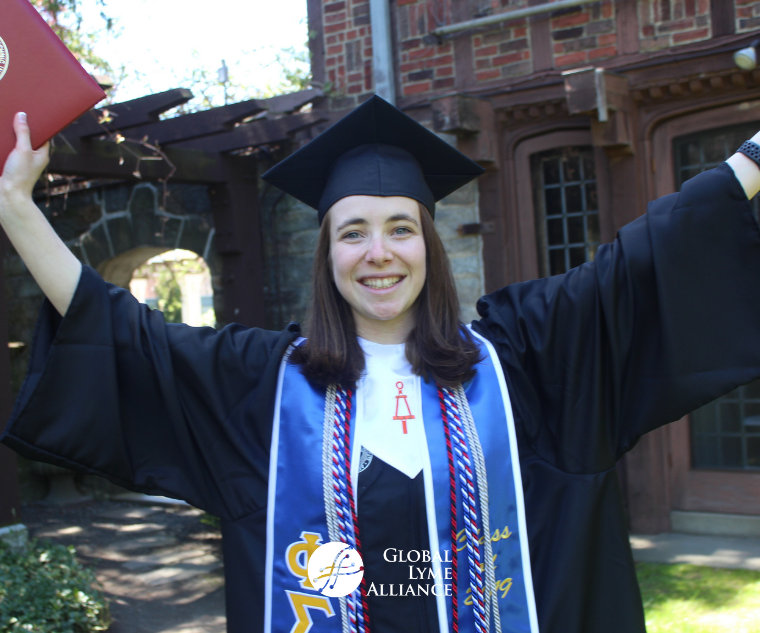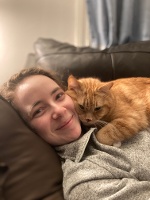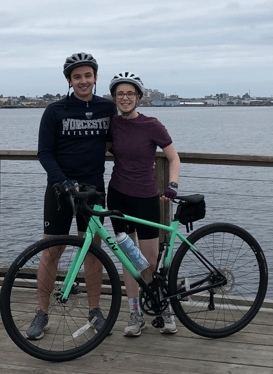
Zoe Schwartz is sharing her Lyme disease and Bartonella story in an effort to spread awareness.
Before Lyme disease and Bartonella, I was a varsity collegiate field hockey player. I was easily able to run half marathons and exercise every day. During the spring of 2018, I spent a semester studying in Costa Rica. After my trip, I began experiencing a plethora of strange symptoms. I was unable to run, let alone walk for more than five minutes.
Eventually, I was diagnosed with Lyme and Bartonella. My symptoms were neurologically-based, which made completing my senior year of engineering school quite difficult. Despite health challenges, I graduated with the highest honors, on time, in 2019.
Over the past three and a half years, my symptoms have expanded to reach almost every system in my body: joint and neck pain, fatigue, body tremors, air hunger, brain fog, exercise intolerance, and fevers. The list could go on. Fortunately, I have had access to diverse treatments and have begun to slowly heal, but It has not been an easy road. I was treated with antibiotics and herbs for about eighteen months. I then switched to just herbs, supplements, and frequent osteopathic manipulations.
Lyme and Bartonella have turned my life completely upside down in almost every way possible, but this experience has also shown me my true strength.
Almost four years into this journey, I am not 100% back to “normal,” but I have been improving. Having Lyme and Bartonella have turned my life completely upside down in almost every way possible, but this experience has also shown me my true strength. I have balanced working full time as an engineer with getting my master’s degree in mechanical engineering and managing my health. Navigating the healthcare system is a full-time job within itself.
 Having Lyme and Bartonella has also taught me the importance of listening to my body. I have learned nothing is more important than health, not even good grades! Losing some of my biggest sources of joy, running and field hockey, this experience has also taught me to celebrate incremental steps to recovery: consistently being able to do yoga, walk around the neighborhood, getting back on my bike. Every time I do these things, I am forever grateful and don’t take anything for granted. This past summer, I worked up to cycling 15 miles at a time, and it felt like the biggest accomplishment! I treated every ride like it was my first, and it was the best feeling. As I have slowly been able to ease back into small aspects of my old active lifestyle, I have also been forced to redefine myself in many ways and find other outlets of happiness. Whether this now be cuddling with my cats, reading a good book, or even knitting a hat, I have been given the opportunity to explore other areas of interest and excitement for me that previously I may not have slowed down enough to enjoy or discover.
Having Lyme and Bartonella has also taught me the importance of listening to my body. I have learned nothing is more important than health, not even good grades! Losing some of my biggest sources of joy, running and field hockey, this experience has also taught me to celebrate incremental steps to recovery: consistently being able to do yoga, walk around the neighborhood, getting back on my bike. Every time I do these things, I am forever grateful and don’t take anything for granted. This past summer, I worked up to cycling 15 miles at a time, and it felt like the biggest accomplishment! I treated every ride like it was my first, and it was the best feeling. As I have slowly been able to ease back into small aspects of my old active lifestyle, I have also been forced to redefine myself in many ways and find other outlets of happiness. Whether this now be cuddling with my cats, reading a good book, or even knitting a hat, I have been given the opportunity to explore other areas of interest and excitement for me that previously I may not have slowed down enough to enjoy or discover.
For anyone dealing with similar symptoms, I have found it is imperative to build a support system, whether it be a medical team, friends, family, or pets. I have been so lucky to live with the most supportive boyfriend and the best two cats a gal could ask for. I would not have gotten through the past two years without them.
I’ve also learned that it is vital to advocate for yourself. Nobody knows your body as well as you do. Try to learn as much as you can, so you are educated enough to know the right questions to ask especially within the complex and political world of Lyme and Bartonella. Similarly, don’t be afraid to ask for help, and write everything down (especially if dealing with brain fog). I have found keeping a daily log of symptoms really helps during medical appointments and to track progress.
 Finally, the last thing I have learned is the importance of sharing your story. I do so in hopes of being able to help others avoid some of the negative experiences I have had. Although not always easy, by having shared my story, I have had people from different parts of my life reach out for advice about how to navigate Lyme/Bartonella. This makes some of the struggles feel like they have a greater purpose. Sharing my story has also helped me remember we are more than our disease, which is sometimes hard to remember.
Finally, the last thing I have learned is the importance of sharing your story. I do so in hopes of being able to help others avoid some of the negative experiences I have had. Although not always easy, by having shared my story, I have had people from different parts of my life reach out for advice about how to navigate Lyme/Bartonella. This makes some of the struggles feel like they have a greater purpose. Sharing my story has also helped me remember we are more than our disease, which is sometimes hard to remember.
I think more research is needed to hone Bartonella treatments, so I am happy to help spread awareness for this debilitating condition and help all of our voices be heard. Hopefully, with more scientific developments and research, diagnosis and treatment will become less and less like searching for a needle in a haystack and science will advance to hopefully find more defined “cures.”
The above material is provided for information purposes only. The material (a) is not nor should be considered, or used as a substitute for, medical advice, diagnosis, or treatment, nor (b) does it necessarily represent endorsement by or an official position of Global Lyme Alliance, Inc. or any of its directors, officers, advisors or volunteers. Advice on the testing, treatment or care of an individual patient should be obtained through consultation with a physician who has examined that patient or is familiar with that patient’s medical history.
-1.png)
Zoe Shwartz
GLA Contributor
*Opinons expressed by contributors are their own. Zoe Schwartz is a mechanical engineer from Rhode Island. She has been battling Lyme disease and Bartonella for four years. Prior to getting sick, she was a varsity field hockey player in college. She is passionate about inspiring the next generation of female engineers.
Email: schwartzzoe2@gmail.com